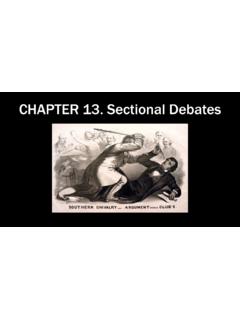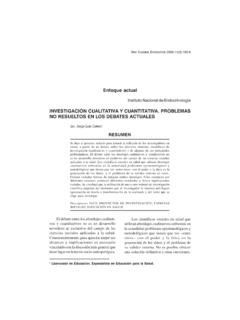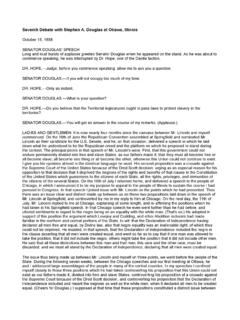Transcription of Should monetary and –scal policy take an active role in ...
1 Notes From macroeconomics ; Gregory Mankiw'. part 5 - MACROECONOMIC policy DEBATES. ch14 - stabilization policy ? Should monetary and scal policy take an active role in trying to stabilize the economy, or Should remain passive? Should policymakers be free to use their discretion, or Should they be committed to following a xed policy rule? Below we consider some problems with policy making 1. Ozan Eksi, TOBB-ETU. Notes From macroeconomics ; Gregory Mankiw'. Argument 1: The Cause of Crisis It depends the cause of crisis, on which Economists are usually disagree Argument 2: Lags in the Implementation and E ects of Policies The inside lag is the time between a shock to the economy and the policy action responding to that shock The outside lag is the time between a policy action and its in uence on the economy A long inside lag is a central problem with using scal 2.
2 Ozan Eksi, TOBB-ETU. Notes From macroeconomics ; Gregory Mankiw'. policy . Because changes in spending or taxes require the approval of higher authorities monetary policy has a substantial outside lag. This is because monetary policy works by changing the interest rates, which in turn in uence investment. But many rms make investment plans far in advance Automatic stabilizers stimulate or depress the economy when necessary without any deliberate policy change Income taxes, the unemployment-insurance and welfare systems 3. Ozan Eksi, TOBB-ETU. Notes From macroeconomics ; Gregory Mankiw'. Argument 3: The Di cult Job of Economic Forecasting Economic developments are often unpredictable Argument 4: The Lucas Critique Lucas has emphasized that optimal decision rules of eco- nomic agents vary systematically over time Hence, it is naive to try to predict the e ects of a change in economic policy entirely on the basis of relationships observed in aggregated historical data Economists evaluating alternative policies need to consider how policy a ects agents'expectations 4.
3 Ozan Eksi, TOBB-ETU. Notes From macroeconomics ; Gregory Mankiw'. Should policy Be Conducted by Rule or by Discretion? policy is conducted by rule if policymakers announce in advance how policy will respond to various situations and commit themselves to those rules policy is conducted by discretion if policymakers are free to choose whatever policy seems appropriate at the time of events The debate over rules versus discretion is distinct from the debate over passive versus active policy ( policy can be conducted by rule and yet be either passive or active ). 5. Ozan Eksi, TOBB-ETU. Notes From macroeconomics ; Gregory Mankiw'. Why commitment could be a better alternative to discre- tion?
4 Distrust of Policymakers and the Political Process If politicians are incompetent or opportunistic, then we may not want to give them the discretion to use the pow- erful tools of monetary and scal policy Politicians often do not have su cient knowledge to make informed judgments, which allows them to pro- pose incorrect but super cially appealing solutions to complex problems 6. Ozan Eksi, TOBB-ETU. Notes From macroeconomics ; Gregory Mankiw'. Manipulation of the economy for electoral gain, called the political business cycle ..The Time Inconsistency of Discretionary policy In some situations policymakers may want to announce in advance the policy they will follow in order to in uence the expectations of private decisionmakers.
5 But later, af- ter the private decisionmakers have acted on the basis of their expectations, these policymakers may be tempted to renege on their announcement. Hence, to make their an- nouncements credible, policymakers may want to make a commitment to a xed policy rule. 7. Ozan Eksi, TOBB-ETU. Notes From macroeconomics ; Gregory Mankiw'. Ex: Negotiating with terrorists over the release of hostages Ex: Consider the dilemma of a CB that cares about both in ation an unemployment. According to the Phillips curve, the trade-o between in ation and un- employment depends on expected in ation. To reduce expected in ation, the CB might announce that low in ation is the paramount goal of monetary policy but does not ful ll it promise then.
6 As a result, CB loses credibility, which leaves the economy with higher in a- tion rates in the longer run 8. Ozan Eksi, TOBB-ETU. Notes From macroeconomics ; Gregory Mankiw'. Rules for monetary policy CB were to commit to a rule for monetary policy , what rule Should it choose? Some economists believe that uctuations in the money supply are responsible for most large uctuations in the economy They advocate that the CB keep the money supply growing at a steady rate (stabilizes aggregate demand only if the velocity of money is stable). A second policy rule that economists widely advocate is that CB announces a planned path for nominal GDP. 9. Ozan Eksi, TOBB-ETU.
7 Notes From macroeconomics ; Gregory Mankiw'. If nominal GDP rises above the target, the CB reduces money growth to dampen aggregate demand A third policy rule that is often advocated is in ation targeting. Like nominal GDP targeting, in ation tar- geting insulates the economy from changes in the ve- locity of money. In addition, it is easy to explain to the public Notice that all these rules are expressed in terms of some nominal variable: the money supply, nominal GDP, or the price level. One can also imagine policy rules expressed in terms of real variables, such as real GDP growth rate or the unemployment rate, but this is not a common approach 10. Ozan Eksi, TOBB-ETU.
8 Notes From macroeconomics ; Gregory Mankiw'. Ch15 - Government Debt Problems in Measurement The government budget de cit equals the amount of new debt (or printing money) the government needs to issue to nance its operations Pt(Gt Tt) + Bt 1it 1 + Btyp 1iyp t 1 = Bt i t + Bt yp yp it (+P Mt). There is a discussion that the budget de cit does not accu- rately gauge either the impact of scal policy on today's economy or the burden being placed on future generations of taxpayers 11. Ozan Eksi, TOBB-ETU. Notes From macroeconomics ; Gregory Mankiw'..Measurement Problem 1: In ation and Real GDP Growth Nominal government debt may rise at the same time with decline in real government debt Real government debt may rise at the a rate lower than the real GDP growth.
9 Measurement Problem 2: Capital Assets When a person borrows to buy a house, we do not say that he is running a budget de cit A budget procedure that accounts for assets as well as liabilities is called capital budgeting 12. Ozan Eksi, TOBB-ETU. Notes From macroeconomics ; Gregory Mankiw'. The major di culty with capital budgeting is that it is hard to decide which government expenditures Should count as capital expenditures ..Measurement Problem 3: Uncounted Liabilities Some economists argue that the measured budget de cit is misleading because it excludes some important govern- ment liabilities For example, consider the pensions of government workers. These workers provide labor services to the government today, but part of their compensation is deferred to the future 13.
10 Ozan Eksi, TOBB-ETU. Notes From macroeconomics ; Gregory Mankiw'..Measurement Problem 4: The Business Cycle Many changes in the government's budget de cit occur automatically in response to a uctuating economy For example, when the economy goes into a recession, in- comes fall, so people and rm pay less taxes. Moreover, more people become eligible for government assistance, so government spending rises So, the de cit can rise or fall either because the economy has changed direction. To solve this problem, the govern- ment calculates a cyclically adjusted budget de cit (some- times called the full-employment budget de cit). It is the estimate of what government spending and tax revenue 14.





